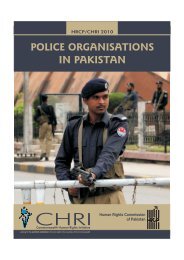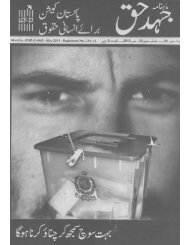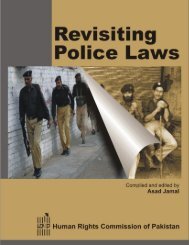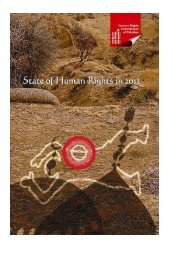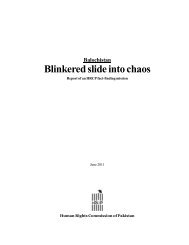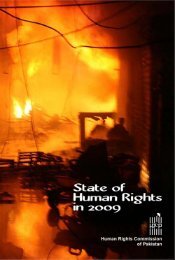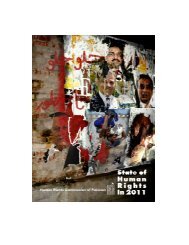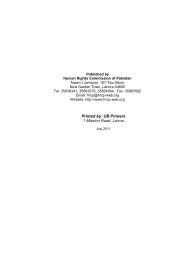Download PDF file - HRCP
Download PDF file - HRCP
Download PDF file - HRCP
You also want an ePaper? Increase the reach of your titles
YUMPU automatically turns print PDFs into web optimized ePapers that Google loves.
Conflict in Balochistan 62<br />
and the denial of due process to him. In the other case Khan Mohammad Ghulamani was arrested for snatching a<br />
motor-bike from intelligence personnel. He was detained at an intelligence office for four days after which his dead<br />
body was found abandoned. It was said that diyat money was quietly paid to the victim’s family when the matter<br />
became a public issue.<br />
Journalists<br />
At Khuzdar, journalists complained of lack of respect for freedom of expression. The nationalist papers were<br />
denied government advertisments. One proprietor could not find a press to print his daily and had to close it down.<br />
The journalists said they were intimidated by tribal sardars as well as the intelligence agencies. The information<br />
officials regularly offered press advice. Example: The publications were told to give maximum coverage to the Prime<br />
Minister’s speech against the nationalist elements. In another instance they were told to give minimum coverage to<br />
Khair Bakhsh Marri’s statement.<br />
Drug trafficking<br />
Trafficking in drugs was found to be a major issue in the Turbat district. Large quantities of narcotics are<br />
believed to be dumped in Turbat and Tump before being transported across the border with Iran. There were<br />
widespread complaints of collusion between the drug mafia and the police, Frontier Constabulary, the Anti-Narcotics<br />
Force, and the Coastguards. The people were generally fed up with the drug traffickers who operated quite openly<br />
but were afraid of retaliation if they complained. It was said that the police and the other concerned agencies leaked<br />
out informer’s identity to the drug mafia. In some cases drug addicts had pointed out links in the trafficking chain but<br />
no clampdown followed. It was strongly alleged that journalists who had taken pictures of drug traffickers’ operations<br />
and dens were called by the police and warned against taking such pictures. Several journalist in Turbat asserted they<br />
had informed the police chief of a drug mafia’s den but it was still functioning. They had also told the District Nazim<br />
about it. The latter had said he had neither the power nor the resources to deal with drug traffickers. He could only<br />
open a rehabilitation centre but was doubtful of its sustainability.<br />
The Turbat district police chief blamed the people for not coming forward to give evidence in drug-related cases.<br />
He acknowledged the risks faced by witnesses against the powerful drug barons, but stressed their moral and social<br />
responsibility to fight crime. He could accept no responsibility for protecting them.<br />
Drug addiction, even amongst women, appeared to be on the rise. Known cases were limited to those arrested.<br />
Several deaths in custody had been reported mostly caused by absence of detoxification facilities. While one or two<br />
such facilities were pointed out, there were no public or private (NGO) centres for the rehabilitation of addicts.<br />
Several journalists in Turbat asserted they had informed the authorities of these deficiencies.<br />
Rights of the disadvantaged<br />
Minorities<br />
Mekran seems to have retained its tradition of tolerance. The Hindu and Christian minorities display no visible<br />
feelings of insecurity. The Zikris had suffered persecution in the past, largely at the hands of orthodox Sunni clerics<br />
who were pursuing political gains through religio-political parties, but they did not feel threatened now. The level of<br />
tolerance is attributed to the strength of political groups in the region. However, the minorities do complain of neglect.<br />
The Christian community considered domicile a major concern for them. There was no graveyard for Christians in<br />
Turbat (80-85 families) and their dead were buried in Muslim graveyards at night under police protection. The Hindu<br />
community was targeted in the wake of the Babri mosque’s demolition. Compensation was promised but not paid.<br />
The temples that were destroyed were however rebuilt and the government made a financial contribution (some<br />
money was given). However, though appearing insecure the members of the minority communities were cautious in<br />
their interaction with the <strong>HRCP</strong> team. Some of them voiced protest at what they described as the demeaning attitude<br />
of authorities towards them and the disdain with which their pleas were received.<br />
At Khuzdar, the members of the Hindu community complained of problems in getting visas for India and pressed<br />
for the opening of the land route through Sindh (Khokhrapar). It was said that there was not a single Hindu in<br />
government service in the whole district although they had some doctors / engineers in their community. The<br />
community had suffered losses in 1992. One person was killed. Compensation had been promised but not given. The



